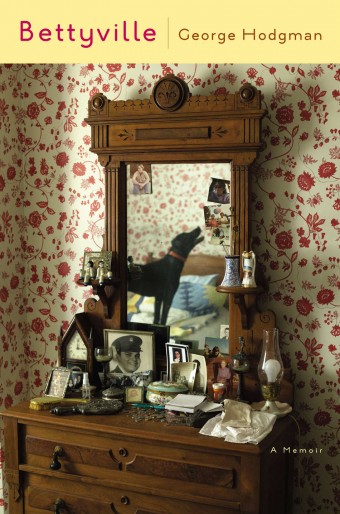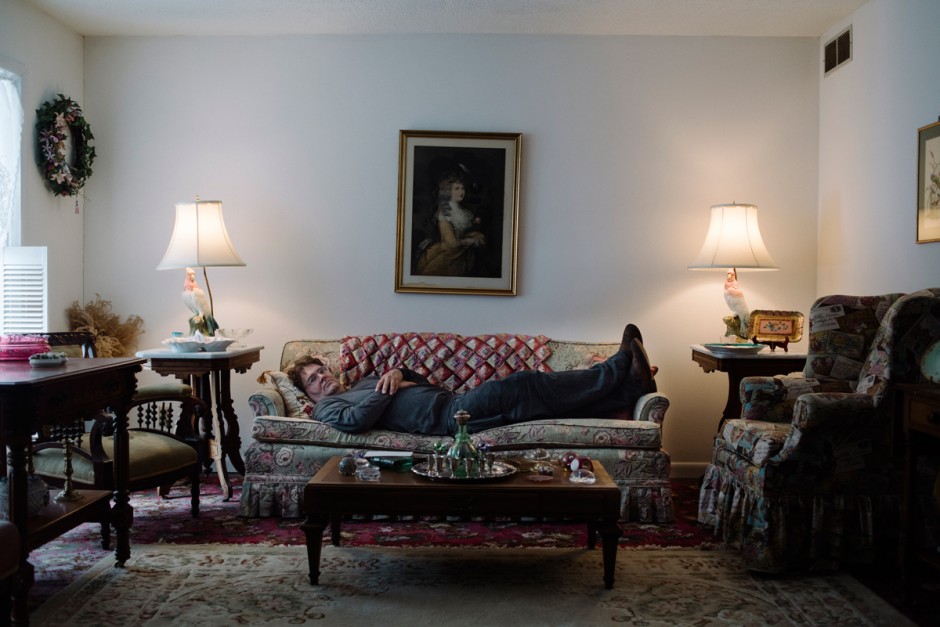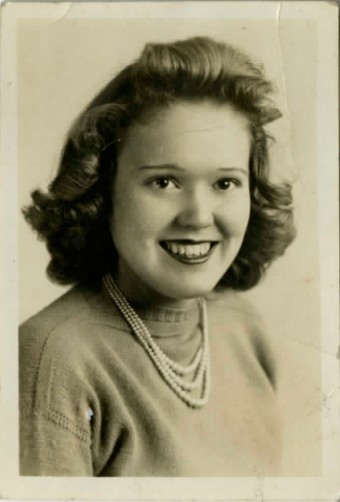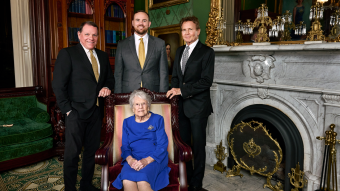

George Hodgman knew his book was going to be a tough sell: Former New York editor with stints at Vanity Fair and Simon & Schuster moves to his hometown, Paris, Missouri, to take care of his aging mother. Out of necessity (“I had to keep from going crazy”), he starts chronicling their experiences. The result is his first book, Bettyville, a witty and wry but often heartbreaking memoir covering everything from growing up gay in small-town Missouri to visiting assisted-living facilities with loved ones.
“This is a story about a fat man and an old lady,” quips Hodgman, BA, BJ, BJ ’81. “It’s not exactly the formula for a commercial success.”
But against all odds, it is a commercial success. A New York Times best-seller, Bettyville (Viking, 2015) is in its sixth printing, and Paramount TV is developing a television series based on the memoir (picture former Saturday Night Live cast member Bill Hader as Hodgman).
And once again, Hodgman is returning to his roots — this time to Mizzou, where he is an instructor in the Department of English. Although he’s disappointed that his former professors Albert Devlin and Catherine Parke have retired, he’s happy to be back where it all started.
“My university experience has made me a better worker, a better employee — no matter what I was doing — and has led to ways of thinking that led to my advancement,” Hodgman says, “and sometimes even success.”
From Madison to Manhattan

Hodgman grew up in Madison, Missouri, population 528. When he was in high school, his parents, Betty Anne Baker, BS Ed ’47, and George Albert Hodgman, moved the family to Paris, Missouri, population 1,248.
But even in a small town, there were big personalities, and Hodgman was always overhearing conversations, observing interactions and crafting stories in his mind. He arrived in Columbia in 1977 to study at the University of Missouri School of Journalism and English department.
At Mizzou, Hodgman tried his hand reporting for the Maneater and the Columbia Missourian but felt more comfortable wielding a red pen than a tape recorder. He felt even more at home in his English classes, where he encountered poetry for the first time.
“My head and my mind were waking up to tone of voice in terms of writing and the idea that it was important not to just have clean sentences,” Hodgman says, “that you could be yourself on the page.”
After graduating from MU, Hodgman earned a master’s degree in English and American literature from Boston College before moving to New York and entering the book-publishing world. At Simon & Schuster, Hodgman worked his way up from writing dust-cover copy to editing books such as Abraham Verghese’s My Own Country.
In 1992, he became an editor at Vanity Fair, where he worked with the likes of Buzz Bissinger and Sylvia Nasar. He eventually returned to editing books, working on Kevin Boyle’s Arc of Justice, which won the National Book Award and was finalist for the Pulitzer Prize.
Hodgman attributes his success in editing to his training in Mizzou’s School of Journalism.
“A lot of people who go into publishing in New York have liberal arts degrees,” Hodgman says. Hodgman, in contrast, had experience with the fast-paced and detailed copy editing J-School students are trained to do. “That really helped me.”
By the time Hodgman left New York in 2011, he had lost his publishing job and was freelancing. Burned out, he was ready for a change.
From Brooklyn to Bettyville

Hodgman wasn’t planning to move in with his mother when he went home for her birthday. But when he found out she had lost her driver’s license and her health was declining, he decided to stay. Hodgman’s father had died in 1997, and he had no siblings to provide support. Almost overnight, Hodgman’s role went from loved one to caregiver.
Needing an outlet, Hodgman first took to Facebook, recounting stories and scenes from his days caring for Betty. From screening Dirty Dancing weekly to cooking tuna casseroles, Hodgman documented his and Betty’s daily life.
As the book evolved, Hodgman found some things were difficult to write about, such as his parents’ discomfort with his identity as a gay man. But the hardest part was the possibility of hurting his mother.
“My mother is the heroine of the story in terms of the fact that she tried so hard to hold onto herself and keep doing normal things,” Hodgman says. “In order to show how hard that was, I had to show how difficult some moments were. That made me feel very guilty.”
Betty’s condition continued to worsen — she developed dementia and cancer — but she was able to attend a few readings Hodgman gave of Bettyville. Although she revealed little of her reaction to her son’s memoir, she offered one recurring observation. “Her inclination was always that I’ve talked too long,” Hodgman says. “That was her big thing.”
Betty Hodgman died in her home July 26, 2015, at 92.
But Bettyville is still a big part of Hodgman’s life. Fans of the book post on his Facebook wall every other day, thanking him for his candid take on caring for aging loved ones.
“This is a book that’s very honest and that says, ‘Jeepers, I’m scared. I don’t know that I can do this. I don’t know whether I can deal with the insurance companies. I don’t know whether I can deal with the doctors. I don’t know whether I can deal with the sadness,’ ” Hodgman says. “I think a lot of people can relate to that.”
From Paris to Columbia

Hodgman is now embarking on the next chapter in his life. During the fall 2015 semester, he is teaching Advanced Writing of Nonfiction Prose in the MU Department of English. Students dissect the work of David Sedaris, Mary Karr and Katherine Boo, among others.
“My hope is that we can come to some realistic understanding of the various skills nonfiction requires, from seeing what could be a story to writing to structuring to researching to reporting to interviewing,” Hodgman says.
Trudy Lewis, professor of English and director of creative writing, says students could learn a lot from Hodgman’s Bettyville, too.
“It’s gotten a lot of praise for being about Missouri and caretaking, with a sense of humor,” Lewis says. “But the other part that I like is that subtly interwoven within this narrative of caretaking are stories about the difficulty of growing up gay in central Missouri. The structure and control of it are very extraordinary.”
But the biggest lessons students can take away from Hodgman? “It is a story of success that comes out of despair.”



